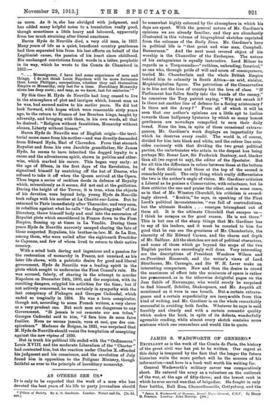AS OTHERS SEE US.*
IT is only to be expected that the work of a man who has devoted the best years of his life to party journalism should
• Pillars of Society. By A. G. Gardiner. London: Nisbet and Co. Lis. Gd.
set.]
be somewhat highly coloured by the atmosphere in which his days are spent. With the general nature of Mr. Gardiner's opinions we are already familiar, and they are abundantly illustrated in this volume of biographical sketches reprinted from the columns of the Daily News. Mr. Gardiner's hero in political life is " that great and wise man, Campbell- Bannerman." And the next most revered object of his worship is the Chancellor of the Exchequer. The nature of his antagonisms is equally instructive. Lord Milner he regards as a Torquemada—" ruthless, unbending, fanatical," as one who, through pride of will and scorn of consequences, trailed Mr. Chamberlain and the whole British Empire behind him to calamity in South Africa—an arid, sinister, Mephistophelian figure. The patriotism of the Conservative is to him not the love of country but the love of class. " If Parliament has fallen finally into the hands of the enemy," he conceives the Tory patriot saying, " Why not smash it? Is there not another line of defence for a fleeing aristocracy P Is there not the Army P " From all of which it will be seen that our author's opinions are a little apt to incline towards those halfpenny hysterics by which so many honest gentlemen are nowadays compelled to earn their daily bread. None the less, in spite of these occasional extrava- gances, Mr. Gardiner's work displays an impartiality for which he deserves every credit. The world is, cf course, divided for him into black and white, and the colour line coin- cides curiously with that dividing the two great political parties, the unfortunates who attain to the deepest hue being perhaps Mr. Boner Law, Sir Frederick Banbury, and, blacker than all (we regret to say), the editor of the Spectator. But for all this the difference in colour between those at the bottom of the first division and those at the top of the second is remarkably small. The only thing which really differentiates the two is the author's angle of vision. Mr. Gardiner criticizes a Liberal as he praises a Conservative, with reluctance, but he does criticize the one and praise the other, and in some cases, as in that of Mr. Winston Churchill, his criticism is exceed- ingly shrewd. "Ruskin," he says, in speaking of the First Lord's political inconsistencies, "was full of contradictions, but the ultimate Ruskin . . . emerges triumphant out of them all. It is the ultimate Churchill that escapes us— I think he escapes us for good reason. He is not there." This is but one of the sharp things that Mr. Gardiner has to say of his leaders, and it must be counted to him for good that he can see the greatness of Mr. Chamberlain, the sincerity of Sir Edward Carson, and the charm and depth of Mr. Balfour. All the sketches are not of political characters, and some of those which go beyond the scope of the two English parties are exceedingly well done. Very interesting are the descriptions of President Woodrow Wilson and ex-President Roosevelt, and the writer's views of Lord Strathcona, Mr. Carnegie, and Sir W. H. Lever make an interesting comparison. Now and then the desire to crowd the maximum of effect into the minimum of space is rather too pronounced, as in the otherwise delightful pages on the Jam Sahib of Nawanagar, who would surely be surprised to find himself, Schiller, Shakespeare, and Mr. Asquith all mentioned as it were in one breath. But a certain extrava- gance and a certain superficiality are inseparable from this kind of writing, and Mr. Gardiner is on the whole remarkably successful in avoiding both faults. Whatever he says is said forcibly and clearly and with a certain romantic quality which makes the book, in spite of its defects, wonderfully agreeable reading, while almost every sketch contains some sentence which one remembers and would like to quote.


















































 Previous page
Previous page